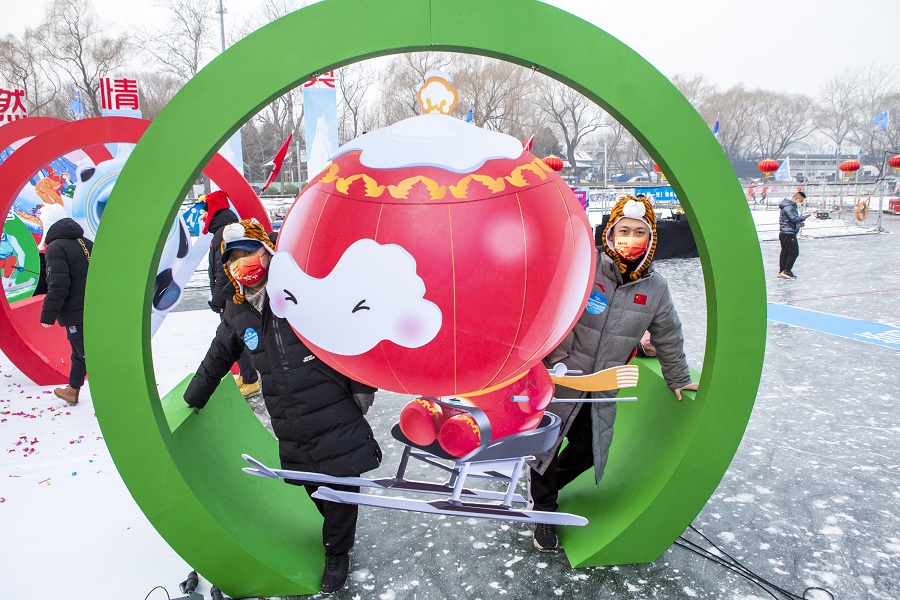The Singular Beijing 2022 Winter Olympics

The Winter Olympic Games is a major international multi-sport event featuring snow and ice games, held once every four years. The Beijing 2022 Winter Olympics stands out from the previous Winter Games thanks to efforts to foster international unity and enhance environmental protection implemented by the host country.
Deeper perspective requires looking all the way back to the first Winter Olympic Games in Chamonix, France in 1924. Baron Pierre de Coubertin founded the International Olympic Committee (IOC) in 1894, which led to the first modern Summer Olympic Games in Athens, Greece, in 1896. The IOC is the governing body of the Olympic Movement, and the Olympic Charter defines its structure and authority. The first five Winter Olympic Games consisted of nine disciplines: bobsleigh, curling, ice hockey, Nordic skiing (divided into military patrol, cross-country skiing, Nordic combined, and ski jumping), and skating (both figure skating and speed skating). The Winter Olympic Games have evolved much since their inception and played a major role in bringing countries together. Since 1992, many new sports have been added to the Olympic program including short-track speed skating, snowboarding, and freestyle skiing.
At the Beijing 2022 Winter Olympics this February, alpine skier Arif Mohammad Khan was the sole Indian representative to compete. So far, India has produced only 15 Winter Olympians. Beijing 2022 marks India’s 11th Winter Olympics appearance. India only joined the Winter Olympics recently, and participants have mostly been from the subtropical country’s far north where snow and ice can sometimes be found.
In contrast, Beijing’s winter is long and usually begins in late October as the northwesterly winds gradually gain strength. The temperature in Beijing from December to February is consistently below freezing. International attention focused on Beijing after it was chosen to host the 2008 Summer Olympic Games. And this year, the international community is witnessing the Winter Olympics held there.
The Winter Olympics creates conversations by providing a common ground and a unified sense of purpose. Love of the winter sports and the passion to compete forges the bonds between players and nations. Hosting the Beijing 2022 Olympic and Paralympic Winter Games as scheduled amid the COVID-19 pandemic evidenced the “determination, efficiency and dynamism” of China, according to IOC President Thomas Bach. The Games creates heroes who serve as positive role models for the youth of the whole world. China’s 18-year-old freestyle skier Gu Ailing, also known as Eileen Gu, who was crowned champion at the Women’s Freeski Big Air final on February 8, has become such a source of inspiration for young people, especially young girls, around the world.
The Winter Olympics improves health and wellbeing and helps build social cohesion and inclusion. It unites nations and creates peace between countries as countries endeavor to be friendly to other countries to create a better and more enjoyable sporting event. The Winter Olympics should be encouraged because it also helps economic capital accumulation and stimulates market mechanisms. It helps strengthen educational institutions through effects on social capital, trust, and culture. And more importantly, it exerts a seriously positive impact on the youth of every country. The Winter Olympics teaches the youth to engage in uplifting patriotism through involvement in sports culture.

January 25, 2022: The National Fitness and Happy Ice and Snow Season 2022 kicks off at the Shichahai ice rink in Beijing. The marriage between the Year of the Tiger and the Beijing 2022 Winter Olympic Games enables the public to further immerse themselves in the Winter Olympics vibe during the Spring Festival holiday. by Ma Gengping/China Pictorial
Beijing 2022 will go down as the first Winter Olympic Games fully powered by green energy. Beijing is committed to hosting a “green, inclusive, open and clean” Games through initiatives including sustainable management of venues, low carbon programs, and sustainable sourcing. Beijing has always placed top priority on ecological preservation, conserving resources, and environmental friendliness. In the Yanqing Zone, a series of environmental protection measures were implemented in the construction of new venues. They included transplanting millions of trees in the mountains that were replaced upon completion of venue construction. Experts from Beijing Forestry University conducted an ecological study to ensure an effective transplanting plan in the conservation area with minimal loss. Important measures included a management and monitoring system for transplanted trees, and the organizers claimed a survival rate of transplanted trees at over 90 percent. Other measures included extensive topsoil stripping, preservation, and reuse programs for restoration purposes after construction was complete.
These sustainability initiatives ensured that environmental protection was always one of the top priorities in the preparation for the Games. Zhangjiakou is known for its rich resources in renewable energy, and much of the power consumption in Chongli District, where all the Zhangjiakou venues are located, comes from renewable energy resources. Other highlights feature many cutting-edge technologies, such as 360-degree virtual reality, smart brushes, new shock absorption, 3D athlete tracking, and many more, making this Winter Olympic Games unprecedented in the application of science and technology.
The Beijing Winter Olympics is a great event harnessing the wisdom of all humanity while bringing people around the world together again. From “One World One Dream” in 2008 to “Together for a Shared Future” in 2022, China’s Olympic movement has revitalized the Olympic spirit.
The author is deputy director of the Xu Fancheng Culture Study Center and founder of the Pondicherry India-China Friendship Association.
